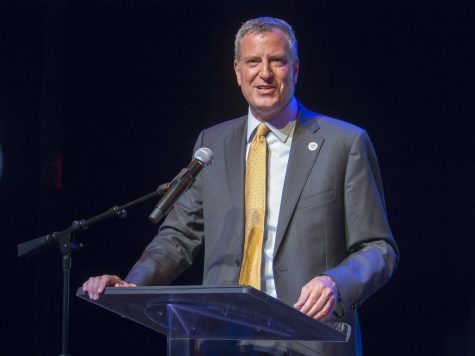An Interview with New York Mayor Bill de Blasio ’79
October 3, 2019

Mayor Bill de Blasio’ 79 grew up in Cambridge and attended CRLS.
Bill de Blasio is the mayor of New York City, and until Friday, September 21st, was running for president. This interview was conducted before de Blasio dropped out of the race.
Register Forum: Okay, so first off, where in Cambridge did you live when you were going to CRLS?
Bill de Blasio: I lived on Bowdoin street right off of Linnaean Street. A fun fact is that my old house and Elizabeth Warren’s house now are literally right next to each other, and we joked about that at the debate.
RF: How long were you a Cambridge resident?
BD: I was in Cambridge pretty much all of my public school education, and lived there full-time through high school and graduated in the class of ’79. I was in the Pilot School when it existed.
RF: What was CRLS like in the late ’70s?
BD: Well I would just say, prefacing with Cambridge, I think Cambridge lost a lot when it lost rent control. I think there was real diversity when I was growing up in Cambridge, especially economically. [There were] a lot of working class folks, a lot of folks who didn’t have a lot of money, and it kind of balanced the whole Harvard and MIT thing. So when I was in Cambridge schools, I was connecting with every kind of person. And I really feel that gentrification has been extreme in Cambridge, and I think unfortunately it has taken away some of the balance that was once there, and the sentiment of it being a place for everyone. And I think it’s a cautionary tale, as is San Francisco today for example. And in terms of the school, when I went into CRLS it had just started as a combined school. There was Rindge Technical School, and Latin which was the more academic school, and there [was] a lot of tension around that.
RF: One of the big policies you have unveiled is on the topic of income inequality, and I was wondering whether your time in Cambridge had any effect on that?
BD: First, let me note that there is a great parallel [between] you and me, as I used to work for the paper, too. If you go to the Register Forum archives of 1978 or ’79, you may find some articles written by me. And my brother Don was the editor around ’69, ’70, or ’71.
But to your question, I was blessed to experience a place growing up that had diversity in every way, including economic diversity. There was always some sense that people could find opportunity, and obviously Cambridge was a place that believed the government should help create fairness, and I think that did influence me a lot. When I graduated in ’79, [which was] right before Reagan was elected, is when the government really started acting on behalf of the wealthy… You know, the tax cuts for the wealthy and peeling back government support for working-class people. And it’s really been 40 years where that’s been the dominant reality.
It doesn’t mean that there weren’t Democrats who tried to push back on that, or tried to swing the pendulum the other way, but overall, that thrust began with Reagan and was amplified by Trump with tax cuts for the wealthy and corporations in the last tax bill. So, I think the inequality crisis really started to begin as I was graduating from CRLS, and now has reached a fever pitch, and now we are at an unsustainable point in terms of income inequality. And that’s a lot of what motivated me to run, especially based on what I did in New York to try and address inequality at its core.
RF: What advice do you have for a kid from CRLS who plans on putting their foot into government?
BD: So I would say a couple things. I think it’s true that if you are active in high school or college, whether it’s a student newspaper, student government, or other forms of activism, it really helps you to become a leader later on. I think people who are feeling that impulse should exercise the muscle early, as it really helps you develop. Obviously, there’s a lot of trial and error in life, and I tried out things in school that sometimes worked and sometimes didn’t work that I’m still benefiting from today.
The second thing I would say is that it is an extraordinarily rewarding life to go into public service and politics.
I knew even back at CRLS that one way or another that would be my life, and it’s been fulfilling, it’s been meaningful, exciting, tiring as all hell—I won’t sugar coat it too much— but I would urge anyone who’s interested to take part. I doubt there is anything that is as fulfilling in such a life long way. I sleep really well at night because I can count all of the things I have done that, I think, have benefitted the world around me, and that’s just extraordinary. Even though it looks challenging, and public life today is filled with a lot of scrutiny, it’s still so rewarding that it makes up for it.
RF: I don’t mean to stump you, but my last question is: who do you cheer for when it’s red sox vs. Yankees?
BD: Oh, I’m very open about my support for the Red Sox. I’ve been super clear from the beginning that I am a very big Red Sox fan, and I decided during my mayoral campaign to out myself and be honest about my support for the Red Sox, and I think that it helped because people thought, “Oh, he must be telling the truth because this sure as hell isn’t for political gain.”
This piece also appears in our September 2019 print edition.








